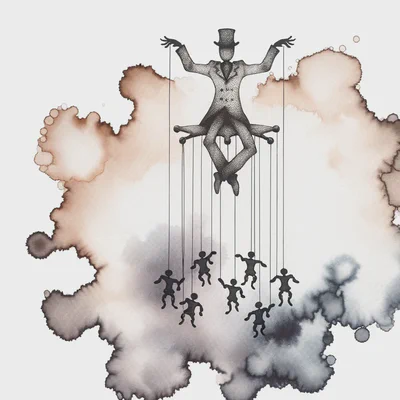An analysis of the hypocrisy in media protests against the EU copyright directive. Jacek Świderski, CEO of Wirtualna Polska, criticizes Google for using journalists' content while employing similar practices.
Table of Contents
Introduction: Do Portals and Newsrooms Really Care About Defending Media and the Ethos of Journalism?
Many of you may have heard solemn expressions of support for the protests by journalists and creators regarding the implementation of the EU copyright directive. There’s talk about the end of true journalism and news portals, about an unfair fight, and the struggle to survive in the market. All of this is expressed in alarmist and very serious tones. In today’s post, I want to briefly examine this issue and see if it’s really about lofty values.
Is it about defending the values of journalism and caring for the end consumer? Or is it simply about money and dividing the pie, further supporting trash journalism (see the publication Trash Journalism, Why Is It So Bad to Work in Polish Media? by Paulina Januszewska), as I have often heard in statements by journalists from various newsrooms on TOK FM. Journalists have repeatedly mentioned that the business model forces them to produce very low-quality content for SEO, meaning to attract traffic from search engines, that there is no place for real journalism anymore because only financial results matter, and those can only be achieved by adapting and existing within the ecosystem created by big tech companies (Facebook, Google search, Google News, etc.). So where do the crocodile tears of these defenders come from?
I think the best material to work with here is an interview on TOKFM with the CEO of Wirtualna Polska: Google is Everywhere in Parliament, where Mikołaj Lizut interviews Jacek Świderski on this controversial issue.
Let’s examine Jacek Świderski’s arguments, because I have a feeling that understanding his reasoning is key to grasping the real motivations of the defenders of journalism and, importantly, the people shaping the narrative of these defenders—what is this really about? This will help us answer whether it’s truly about defending the media and the ethos of journalism, as the advocates of the issue try to argue.
ARGUMENT 1: Unequal Market Conditions and Imbalances
Argument: Świderski points to the inequalities between large tech corporations and local publishers. Google, as a tech giant, has significantly greater financial and technological resources, allowing it to dominate the market.
Consequences: Small and medium-sized media companies, like Wirtualna Polska, struggle to compete with the tech giants, leading to a market imbalance. In May 2024, WP announced the largest layoffs since 2014, cutting 120 positions, almost 10% of its staff. Officially, this was attributed to unfair competition with major platforms and failure to meet financial goals. However, another significant factor may be automation and the implementation of AI technology for content creation and processing, enabling the company to operate in line with big tech principles, at the expense of employment. Therefore, Wirtualna Polska is not fighting against centralization or market monopolization but instead adapting to these principles by adopting technologies that themselves contribute to further centralization and dependence on bigger players. Isn’t this hypocrisy?
ARGUMENT 2: Using Content Without Proper Compensation
Argument: Google uses journalists’ and publishers’ content on its platforms (e.g., in search results) without proper compensation for the creators of that content. Information is displayed without the need to redirect the user to the publishers’ websites.
Consequences: This business model causes publishers to lose potential traffic to their sites, translating into lower advertising and subscription revenues. It’s worth noting Google’s counterargument, which states that indexed content brings traffic to platforms through optimization and cohabitation. In other words, Google claims that having content in search results offers a chance for more users to visit those sites. Świderski wants more money from articles appearing in search results that also contain ads, even on Google’s page. He argues that even a single informative sentence in the search result can suffice, meaning a user looking for the latest news on a certain topic may not click through to WP.PL to read the article and potentially view the ads, which would generate income.
Analyzing WP’s financial report for a selected quarter of 2024, it’s evident that WP relies heavily on advertising revenue. WP criticizes Google for using its content to generate advertising revenue, yet WP uses the same mechanism on its platforms, tailoring content to maximize clicks and profits. So content marketing and SEO are used to drive traffic. WP is not just a victim but also a beneficiary of the ad ecosystem based on user data, as, along with other Google partners, it benefits from this data-processing and content-pumping system. The report clearly shows that WP is investing in ad technologies that enable better targeting and financial optimization.
WP itself uses advanced technologies like artificial intelligence and automation to optimize processes and reduce costs. In 2024, WP carried out mass layoffs, partly explaining this by the implementation of new technologies that replace manual labor. This is an example of WP using similar technologies to those it criticizes Google for, technologies that contribute to market centralization and dominance.
Q2 2024 Report wp.pl
ARGUMENT 3: Manipulating Financial Data:
Argument: Świderski claims that Google manipulates financial data, stating it paid publishers 1 billion PLN over the past three years (see Google’s response to journalists’ protests below). In reality, according to Świderski, Google raked in 250 million PLN from ads sold on publishers’ platforms.
Consequences: According to Świderski, this money could have been invested in developing content and investigative journalism, which is hindered by Google’s policies. For those unfamiliar, this issue revolves around commission rates and splitting the pie. Things are getting interesting, and they will get even more interesting, especially in the context of the quarterly report analysis, which shows what kinds of optimizations are really happening and whether it’s really about “journalism.”
ARGUMENT 4: Lobbying and Political Pressure:
[automatic transcription] HOST: And not just Google. It’s also worth mentioning the visit of Netflix’s CEO to the Polish Prime Minister. In a miraculous way, it stopped the work in the ministry, the Ministry of Culture. ŚWIDERSKI: Yes, you are right, Mr. Editor. It’s not just Google. Generally, tech giants. However, what shocks us is that Google, which probably has ten times the revenue of Wirtualna Polska, the company I represent, pays less tax in Poland than Wirtualna Polska does. For us, it’s shocking that, despite this, they have such influence over Polish politicians.
Argument: Świderski criticizes Google’s strong lobbying efforts in the Polish parliament, which have delayed the implementation of the EU copyright directive. Recently, it became clear that Google is actively involved in parliamentary discussions, influencing politicians’ decisions.
Consequences: Delays in implementing the directive result in financial losses for Poland (a fine of EUR 17,000 per day) and a continued lack of protection for publishers’ rights. What bothers local publishers more is that they don’t have the same lobbying power as big tech, rather than the fact that there is political pressure. Świderski would simply prefer to sit at Open’er with politicians and Google representatives who were discussing things with the youth. Unfortunately, he wasn’t invited, and currently, WP.PL doesn’t have the same ties to those in power as it did under PiS, when many people pointed to potential manipulation of information and withholding of information by the newsroom. So, does Świderski miss journalism or influence in the context of competition between big companies? I’ll leave that question open and direct the reader’s attention to how WP.PL and its newsroom operated during PiS’s rule when they were accused of favoring and cooperating with the government, and when journalism on WP.PL was at a questionable level. I’m referring to controversies over abortion, the women’s strike, or reporting on PiS’s opposition and scandals.
ARGUMENT 5: Świderski Presents Positive Proposals for Revenue Sharing
Argument: In other European countries, Google is already sharing ad revenue with publishers, whereas such agreements have not yet been reached in Poland. Świderski suggests two solutions: Google should stop using publishers’ content, showing only links to articles, or it should start sharing ad revenue generated by that content.
Consequences: According to the CEO of WP.PL, implementing these solutions would aim for a fairer revenue distribution and improve publishers’ financial standing. Wait, have we reached the heart of the issue here? So it’s just about money. It’s not about erasing information (disappearing from Google’s algorithm), manipulating the algorithm (the unclear way content is boosted and disinformation is spread), promoting fake news, or centralizing information flow (information monoculture). It’s simply about getting a bigger slice of the pie. In my opinion, the hypocrisy level has gone off the charts. Google, Facebook, Netflix can do whatever they want as long as they let creators share in the revenue. Given this mindset, it’s no surprise that corporations like Google, Amazon, Netflix, and Meta have gained such dominant positions. It’s short-sighted thinking that doesn’t take into account the centralization of information and consumer habits. Small players eventually become unnecessary and are cut from the market. Polish publishers find themselves in a worse position compared to their European counterparts, affecting their ability to invest in content development and innovation—but it seems to me they all dug their own graves by allowing such extensive collaboration and corporate freedom.
Conclusion of the Hypocrisy Festival
In my last fragment, I analyzed Google’s statement, which was in response to the protests by creators and journalists over plans to implement copyright law and the related issue of companies supplying, or as some say, exploiting creators’ work. I’m writing about this issue because the media, along with big tech, are often accused of manipulating information, as we saw during the attack on Donald Trump.
It seems to me that Świderski’s perspective perfectly illustrates the hypocrisy of the entire protest and the so-called defense of the free press, or at least that’s how those pumping up the issue try to shape the narrative. In reality, it’s not about the values of journalism and access to information but simply about money distribution. WP, like Google, constantly optimizes its revenues by investing in new ad technologies and content management tools. Świderski accuses Google of monopolizing profits, but WP’s quarterly reports show they are implementing similar actions aimed at maximizing profits from traffic on their platforms and ads.
Świderski does not address the issue of disinformation, the dominance of Google’s algorithm, or the centralization of Facebook. For him, that’s fine—he just wants his share of the money. Quarterly reports from the group clearly show that WP is implementing technologies that allow them to apply similar optimization and dominance methods as Google. We are being led to believe that content creators must innovate to stay competitive, meaning they must play by the rules set by big corporations. That’s why, for me, the entire protest is hypocritical because it doesn’t address the core issue—the dominance of big tech and the centralization of information flow, not the distribution of money.
WP Media employees surprised by layoffs. “Like a bolt from the blue”
CEO of Wirtualna Polska: Google is everywhere in Parliament
Grand Press 2023 Awards Gala: WP Journalist Dariusz Faron Among the Winners
Investments drive growth, company sees record revenues – WP Group sums up 2022

